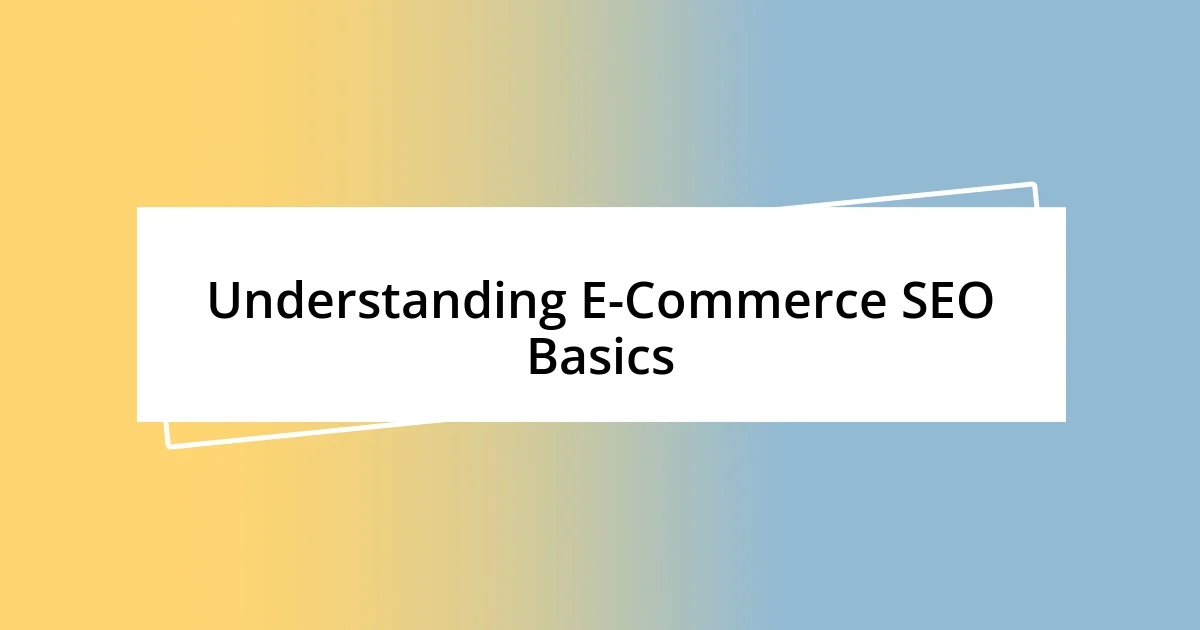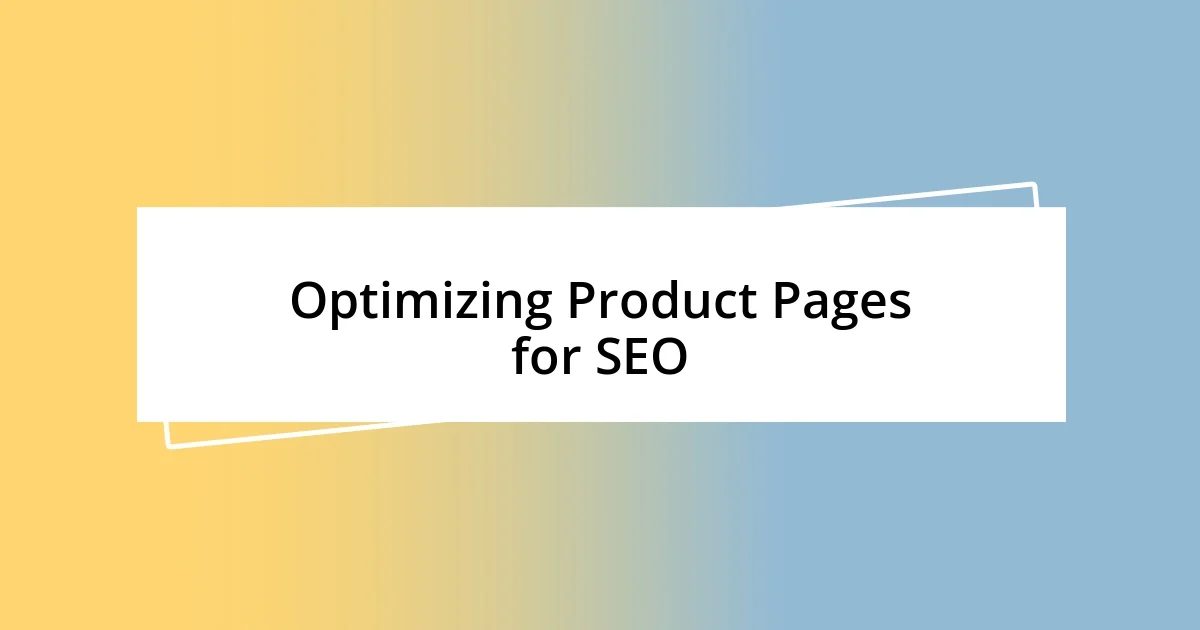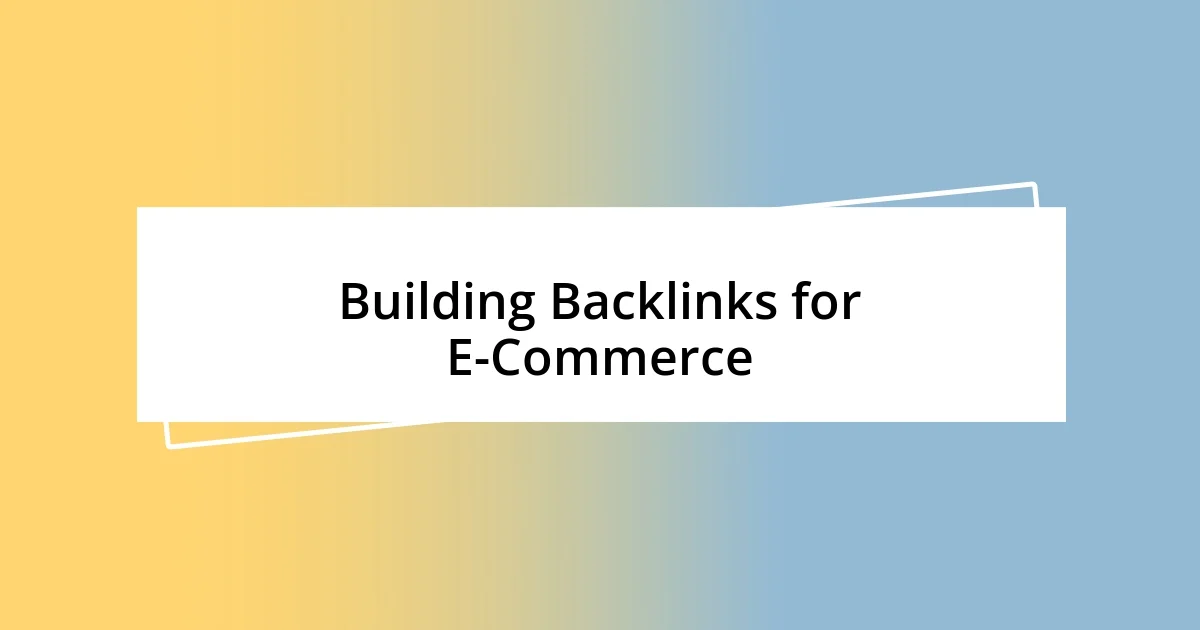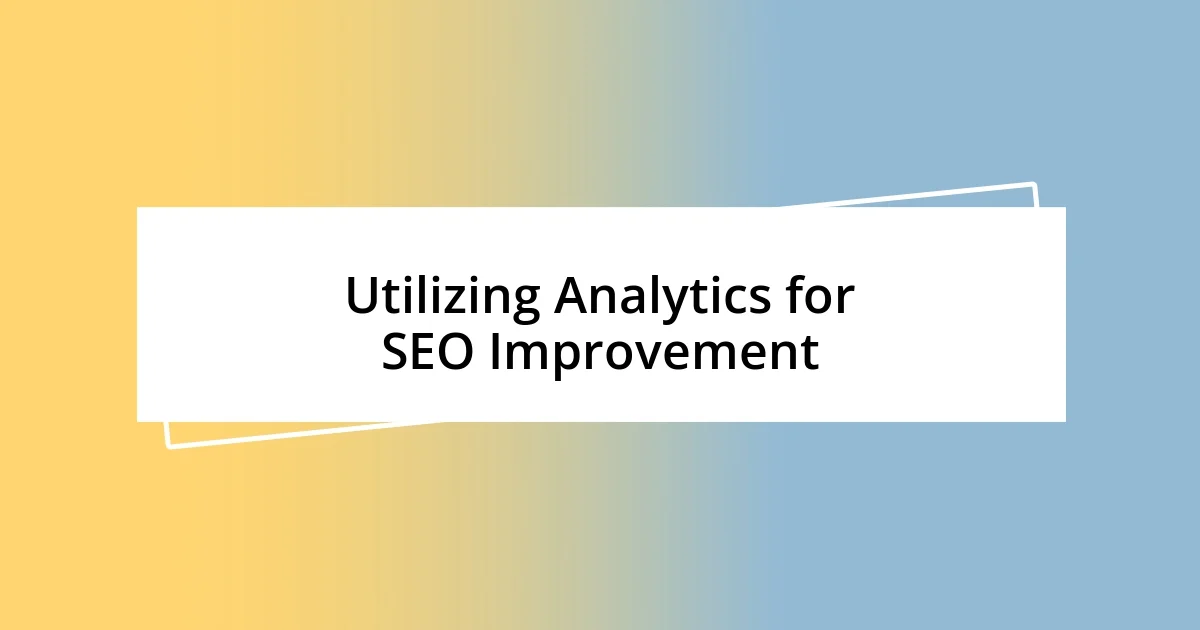Key takeaways:
- Effective keyword research is fundamental for improving visibility, targeting the right audience, and increasing conversions through long-tail keywords.
- Optimizing product pages with unique descriptions, high-quality images, and meta tags enhances SEO and engagement, leading to better sales performance.
- User-generated content and building backlinks through collaborations and valuable content creation significantly boost brand authenticity and search engine rankings.

Understanding E-Commerce SEO Basics
In my experience, understanding E-Commerce SEO basics is like laying the foundation for a sturdy building. Without it, even the most beautiful online store can crumble under the weight of invisibility. I remember setting up my first e-commerce store; it was exciting, but I was utterly lost regarding SEO.
Keyword research became my best friend. I often ask myself, how can potential customers find my products if I don’t use the right words? I started using tools like Google Keyword Planner, which helped me uncover terms my customers frequently searched for. It was a game-changer, transforming my store from an online ghost town to a buzzing marketplace.
Additionally, I felt a sense of empowerment when I learned about on-page optimization. By optimizing product descriptions, images, and meta tags, I saw traffic steadily increase. There’s a thrill in seeing your hard work pay off, isn’t there? It truly highlights how understanding E-Commerce SEO can be a direct pathway to achieving greater visibility and success in a competitive online landscape.

Importance of Keyword Research
Keyword research isn’t just a task; it’s a crucial strategy that can elevate your e-commerce platform to a whole new level. When I first began my journey, I remember feeling overwhelmed by the vast ocean of keywords. One day, I stumbled upon a niche keyword I didn’t even consider before – it felt like discovering hidden treasure! Implementing that keyword into my product descriptions significantly boosted my visibility and connected me with customers who genuinely wanted what I offered.
Moreover, with keyword research, I quickly learned that identifying long-tail keywords is essential. Those phrases that are more specific and often less competitive can lead to higher conversion rates. I recall a time when I focused on one of those lengthy search terms, and it attracted a targeted audience that was already inclined to purchase. I felt an adrenaline rush as the orders came in, knowing I had optimized my content for exactly what those users were searching for.
Let’s not overlook the ongoing nature of keyword research. It’s not a one-and-done situation. Markets evolve, and so do customer preferences. Staying updated on keyword trends helped me pivot my marketing strategy effectively during seasonal changes. I often find myself re-evaluating my keyword strategy, and every time I do, I discover more opportunities. It’s a dynamic process that continually enriches my e-commerce experience.
| Aspect | Importance |
|---|---|
| Visibility | Improves chances of being found in search results |
| Targeting | Attracts the right customers to your store |
| Conversion | Long-tail keywords can lead to higher sales |
| Adaptability | Keeping up with changing trends helps maintain relevance |

Optimizing Product Pages for SEO
Optimizing product pages is a crucial element of e-commerce SEO that I’ve come to appreciate over time. I remember the excitement of launching new products, only to realize that I hadn’t given enough thought to their individual pages. Each product page should serve as a unique landing spot, tailored to both the search engines and potential buyers. When I took a closer look at product descriptions, I started incorporating keywords naturally into engaging narratives that resonated with my customers. It felt like crafting a story rather than just a sales pitch, which made all the difference in connecting with my audience.
- **Unique Product Descriptions**: Ditch the generic specs. Craft descriptions that not only include keywords but also tell a compelling story about the product.
- **High-Quality Images**: I learned the impact of visuals firsthand. Images should be crisp and optimized with alt text that describes the product, enhancing SEO while appealing to customers.
- **Meta Tags and Titles**: I used to neglect these, but they are gateways to better visibility. Each product page now has tailored meta titles and descriptions that invite clicks.
- **Customer Reviews**: Integrating genuine customer feedback has proven valuable. Not only does it build trust, but it also adds fresh content that search engines love.
- **Mobile Optimization**: I once missed out on a lot of sales because my site wasn’t mobile-friendly. Ensuring that product pages look fantastic on mobile devices has drastically improved my traffic and conversions.

Leveraging User Generated Content
User-generated content (UGC) is like a secret weapon in the world of e-commerce. When I first started encouraging customers to share their photos and experiences, I didn’t realize the significant impact it would have. Seeing real people using my products made the brand feel more relatable, creating an emotional connection with potential buyers. Suddenly, it wasn’t just me selling; it was a community sharing genuine experiences.
I remember one particular post from a customer who styled our products in a way I hadn’t imagined. Their creativity sparked a wave of similar posts, and soon I was flooded with content that showcased not just my products but how they fit into people’s lives. It was a powerful reminder of how UGC can amplify brand authenticity. Have you ever wondered how much your customers might inspire others? Through their insights and perspectives, I’ve seen interest in my products soar, translating not just into likes and shares but into actual sales.
Additionally, I found that utilizing UGC effectively can help with SEO too. By featuring these authentic testimonials and images on my website, I noticed a significant uptick in organic traffic. It’s almost like the content created itself while reflecting the spirit of my brand. Have you taken a moment to consider how the voices of your customers could enrich your e-commerce strategy? Every post and reviews boost freshness on your site, giving search engines more to index while building trust with new visitors.

Building Backlinks for E-Commerce
Building backlinks for e-commerce is something I’ve found to be essential for enhancing online visibility. Early in my journey, I experimented with outreach to other websites, offering to write guest blog posts on topics related to my products. I remember the thrill of seeing my brand link pop up on a popular blog—suddenly, I wasn’t just a small player in a vast market; I was gaining credibility and traffic from a trusted source. It became clear to me that every link is not just a pathway to my site; it’s a vote of confidence from another.
Collaborating with influencers has also transformed my approach to backlinks. I recall a specific partnership where an influencer not only showcased my products but linked to my e-commerce site in their blog and social media posts. The boost in referral traffic was fantastic, but the real magic happened in the authentic conversations that unfolded in the comments section. By asking their followers which products they loved the most and why, I inadvertently created a buzz that drew even more organic links back to my site. Have you thought about how leveraging influencers could provide both links and genuine engagement?
Moreover, creating high-quality content is a strategy I can’t stress enough. I once developed an in-depth guide related to my niche, which not only attracted readers but also numerous backlinks from other blogs wanting to reference my work. What surprised me was how this approach brought a steady stream of traffic long after the initial buzz faded. It reinforced my belief that valuable content doesn’t just help with SEO; it builds relationships and positions you as an authority in your field. How could your expertise inspire others to reference your work? That’s the kind of visibility that can transform your e-commerce journey.

Utilizing Analytics for SEO Improvement
Utilizing analytics for SEO improvement has been a game-changer in my e-commerce strategy. I still remember when I first uncovered the treasure trove of data in Google Analytics, realizing I could track which keywords drove traffic to my site. By identifying these key terms, I could fine-tune my product descriptions and content to resonate with what potential customers were actually searching for. Have you ever felt that rush of clarity when data reveals unexpected insights?
Diving deeper into user behavior metrics truly transformed my approach. Observing high bounce rates on specific pages alerted me to potential issues. For instance, I noticed that one product page had beautiful images but lacked essential details. Once I revamped the page to include specifications and customer reviews, the engagement shot up dramatically. Isn’t it fascinating how a small tweak can lead to substantial results? It emphasizes the importance of not just collecting data but actively interpreting it to fuel your SEO efforts.
Moreover, I learned to embrace A/B testing through analytics to optimize my site further. I vividly recall testing two different landing page layouts for a seasonal campaign. One version included a video showcasing my products’ functionality, while the other focused solely on enticing product images. The engagement metrics revealed a significant preference for the interactive video layout, resulting in higher conversion rates. This experience illustrated to me how analytics can guide not just SEO but also enhance overall customer experience. Have you considered trying out different approaches to really discover what resonates with your audience? It’s all about leveraging data to make informed, impactful decisions.

Staying Updated with SEO Trends
Staying updated with SEO trends can often feel overwhelming, but I’ve found that engaging with industry resources makes a significant difference. I recall subscribing to several SEO blogs, and at first, the sheer volume of information was daunting. However, over time, I learned to sift through what was relevant to my e-commerce business. Have you ever stumbled upon a trend that completely shifted your perspective on how to optimize your site? That happened to me last year when I discovered the importance of user experience and Core Web Vitals—suddenly, my site redesign took a new direction and became more focused on speed and usability.
Connecting with fellow e-commerce professionals through forums or social media has also been invaluable. Once, I participated in a Twitter chat discussing algorithm updates, and I was amazed at how quickly I could absorb fresh ideas from industry leaders. Their insights sparked what turned into a pivotal SEO strategy for me, especially concerning mobile optimization. Isn’t it true that sometimes the best advice comes from real conversations rather than reading articles? It’s a reminder that our community can be a treasure trove of knowledge if we’re open to sharing and learning.
Lastly, attending conferences and webinars has enriched my understanding of SEO trends immensely. I still remember a particular session where an expert discussed voice search optimization and how e-commerce sites needed to adapt to this emerging behavior. My initial thought was, “Do customers really search that way?” After implementing key takeaways from the session, I saw an increase in traffic from voice searches. What about you? Have any events or discussions ever inspired you to pivot your strategy in a surprising way? Engaging with the right content and community not only keeps you informed but can also lead to strong breakthroughs in your e-commerce SEO journey.














